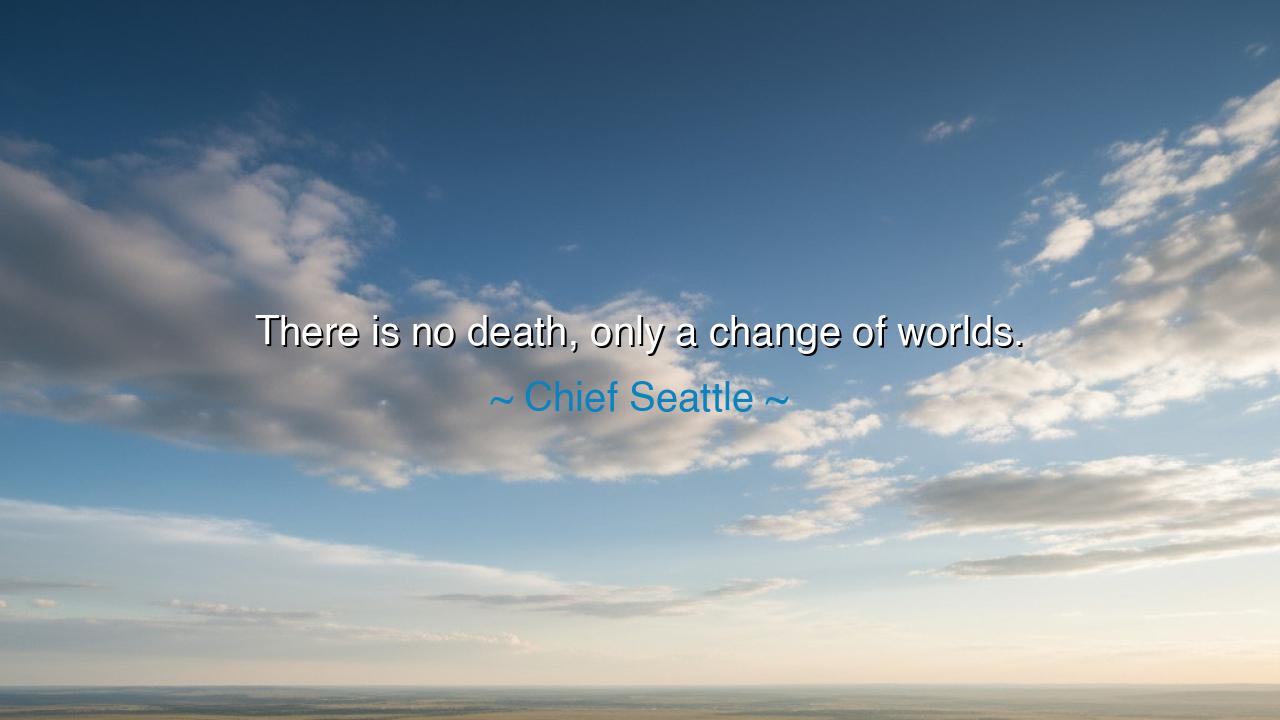
There is no death, only a change of worlds.






Host: The room was bathed in the soft light of the evening, a quiet peace settling over everything. Jack sat by the window, looking out at the fading sunset, his thoughts clearly drifting. Jeeny, sitting across from him, watched him for a moment, sensing something deep in his reflections.
Jeeny: (gently) “You seem lost in thought. What’s on your mind?”
Jack: (looking up, his voice soft) “I was thinking about a quote from Chief Seattle. He said, ‘There is no death, only a change of worlds.’ It made me think about how we see life and death — how different cultures and perspectives approach it. This idea of death not being an end, but a transition to something else.”
Host: Jeeny’s expression softens, clearly moved by the depth of the quote. She sets her cup of tea down and leans forward, her attention fully on Jack, as if absorbing the weight of his words.
Jeeny: “That’s a beautiful way to look at it, isn’t it? Seeing death as a transition rather than an end. I think we often view death as this final, scary thing, but maybe it’s more like crossing into another world, another existence. It doesn’t feel so final when you think of it that way.”
Jack: (nodding) “Exactly. Chief Seattle’s words make death feel less like something to fear, and more like a natural part of the cycle of life. It’s not the end of our journey — it’s just the beginning of a new one. This idea that the world we leave is replaced by something new, something different, almost feels comforting.”
Host: The room grows quieter, as if the idea of death and transition has filled the space with a soft, reflective energy. Jeeny sits back in her chair, her gaze distant as she reflects on the broader implications of the quote.
Jeeny: “It’s also a reminder that everything is part of a larger, ongoing process. Life, death, and what comes after — it’s all connected. Death doesn’t interrupt that flow; it’s just another part of it, another change in the journey. It’s like a shift in perspective — moving from one world to the next.”
Jack: (thoughtfully) “I think that’s why so many cultures throughout history have seen death as a kind of rebirth or continuation. If we think of the world we know as just one phase, then death becomes less about loss and more about transformation. Maybe the fear we have around death is rooted in not fully understanding that change.”
Host: Jeeny’s expression softens with a quiet understanding, and she looks out the window, her thoughts settling into a peaceful reflection.
Jeeny: “Maybe it’s that fear of the unknown that makes death so hard to face. But if we could see it as a natural part of the cycle, like changing seasons or the passage of time, maybe we wouldn’t fear it so much. We would see it as a part of the bigger picture, the ongoing flow of existence.”
Jack: “Yeah, and maybe that would change the way we live too. If we understand that death is just another step in a larger journey, we might live with a greater sense of peace, knowing that every part of life has its place, its meaning.”
Host: The room falls into a comfortable silence, as the weight of the conversation settles between them. The realization that death is not an end but a transition, a part of a larger cycle, brings a sense of quiet understanding. Chief Seattle’s words are a reminder that life and death are intertwined, and that every stage of existence is part of an ongoing journey, one that we are all a part of.






AAdministratorAdministrator
Welcome, honored guests. Please leave a comment, we will respond soon